Jeovani Abenoja, Vocalist

By Jan Askin
Rossmoor Big Band correspondent
Jeovani Abenoja’s great love has always been singing.
Big Band of Rossmoor: Vocalist Jeovani Abenoja gets around
The Big Band of Rossmoor members have greatly missed each other since last March. The band’s directors, Maurice Levich and Greg Brown, have kept band members united through Zoom. Band members look forward to returning to Rossmoor to play Big Band sounds.
As mentioned in previous profiles, Frank Como, late of Rossmoor, was an arranger for and potent force of the Rossmoor Big Band. Vocalist Jeovani Abenoja asked this interview stand in honor of Como.
The Beach Boys’ lyrics “Get around, round, round, I get around” apply aptly to Abenoja. His entry into the Big Band of Rossmoor is one of the more colorful stories of the band’s history. But first, some backstory.
Singing has always been Abenoja’s great love. He can’t really say when he began to use his instrument. It may have developed concurrent with his speech. He loved music class in elementary school, though it wasn’t considered “cool” among his peers like singing. His earliest public performances were as a funeral singer. Any more questions?
Have you ever heard of a singing postman? Abenoja was a postal carrier. For 15 years, he serenaded the folks on his route. He would listen to instrumentals on his ear pods and belt out the lyrics to go along. Afficionados recognized the LP recording of the “Rat Pack at the Sands,” a particular favorite, emanating from his truck.
When asked whether he ever got in trouble for this idiosyncratic behavior, he answered: “Never. I was an exceptional employee.” That seems to have given him latitude.
The Lafayette Chamber of Commerce was on Abenoja’s route. Jay Lifson, executive director of the chamber, suggested he get in touch with Big Band Director Mo Levich, who also happened to be on his route. He subsequently showed up for an “audition.” It can be difficult for a vocalist’s range to fit with the musical selections the Big Band plays.
As he was singing, Levich grabbed his microphone and asked, “Do you want to be in the band?” That was 2012, eight years ago.
Abenoja credits the Big Band of Rossmoor – and Levich in particular – with expanding his horizons beyond his personal boundaries. He has accumulated many memories back to the times that the band appeared at the Del Valle Clubhouse in Rossmoor, now the Fitness Center. He now enjoys the classy Event Center where the band performs.
His fondest memory takes him back to the personal. His conservative Filipino parents taught him traditional values, such as “doing it right” the first time, taking pride in what you do, and being true to yourself. Yet, they stayed pretty close to home, so it was momentous when they attended his first performance with the Big Band of Rossmoor.
Abenoja doesn’t get around quite as much anymore. He left the USPS in order to care for ailing parents, now both deceased. He has resumed his career in delivery as a full-time manager for UPS. He learned the difference between a good manager and a bad one at the USPS and aspires to be the former.
Although he is an enthusiastic sports fisherman, singing is his main avocation. His comfort zone includes ballads, such as “The Shadow of Your Smile.” One of his signature songs and a big hit in Rossmoor is “It Happened in Monterey,” a Frank Sinatra favorite.
In addition to the Big Band of Rossmoor, he also sings for the Bay Area Big Band, Lady K and Kings of Swing, Kenny Brock and the Jambalaya Swing Band and at private parties.
Beach Boy lyrics again: He’s “a real cool head.” All can look forward to many more performances from the singing postman.
Big Band of Rossmoor members will keep rehearsing on Zoom so that they will be ready for their return concert at the Event Center next year.
George Marquis, Guitar
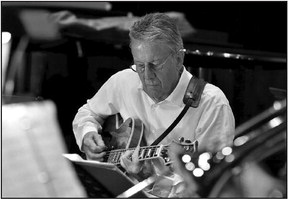
By Jan Askin
Rossmoor Big Band correspondent
Guitarist finds new home with Big Band of Rossmoor
The Big Band of Rossmoor members have greatly missed each other since last March, especially the senior members of the band who are infused with the energy and talent of the student members.
George Marquis, Big Band of Rossmoor guitarist, expressed this sentiment in a recent interview.
One way the band’s directors, Maurice Levich and Greg Brown, have kept band members united has been through Zoom. But the members want to play before an audience and look forward to returning to Rossmoor to play Big Band sounds.
The young musician who asserts a fondness for
practice strains our credulity. However, Marquis proves the exception.
The venerable Gelb Music Studios in Redwood City in-fluenced Marquis’s early exposure to music. His parents en-rolled him and his brother in classes there at a young age. He embraced the opportunity and loved to practice.
Exposure to his French-speaking grandparents heightened his hearing and listening skills, transferring to his ability to hear and make music.
Marquis continued to grow musically. When he was 15, the Gelbs asked him to teach younger students beginner guitar. There was an old upright in the back of the studio; he plunked away, teaching himself to play piano.
In his late teens, Marquis formed a six-piece band. The band played dance tunes and rock and roll up and down the Peninsula for bar mitzvas, junior and senior proms, cotillions and other parties. Revealing his whimsical side, he recounts how the band would change its name, mostly called the Esquires, if it didn’t get a good review. Ah, youth, wearing camel coats and looking smooth.
Marquis subsidized his earnings with the Esquires as a ski instructor and enrolled at Santa Clara University, completing an engineering degree. During this time, Marquis began to date his life mate, Judy. Once, after he took her skiing, he delivered her home with a broken leg, quipping to her father, “This one is broken. Do you have any more?” Dad answered right back,” You break it, you own it.” Following the Pottery Barn Rule, he proposed.
George and Judy began married life overseas, landing in Wales, living in Rome for a year, then in Sardinia for two years. George worked for Kaiser Industries, as a “simple” engineer. Again, playfully, he claims an inability to be civil. The careful listening to French grandparents eased the way to learning Italian and picking up “Sando,” the French-Sardini- an dialect. Except for reunions with the Esquires, Marquis did not play during his professional career.
After retirement, Marquis continued to pursue his woodworking/ building hobby, restoring tear-down houses and, most famously in his family, restoring its bartender double – ended wooden boat still in use on Lake Tahoe.
But music and memories of his youth performing as an Esquire beckoned.
He called around for a group to join. A friend referred him to Levich. The Big Band of Rossmoor didn’t have/need a guitar at the time, but Marquis showed up at rehearsal when the venerable arranger Frank Como presided. He played “Easy Money,” challenged by the jazz chords.
Como immediately approved, and Marquis joined the band in 2016. Marquis loves to dress up in a black tuxedo to play at the Event Center and also more informally at the band’s picnic venue, the Lafayette Reservoir. The Latin tunes in the band’s repertoire are his favorites: “Mas Que Nada,” “Soul Bossa Nova,” “Wave” and “The Girl from Ipanema.”
His favorite tune hearkens back to his youth and the weekly dances at Meek’s Bay, Lake Tahoe. The last song of the evening was always “Tenderly.”
Jim Dilworth, Violinist
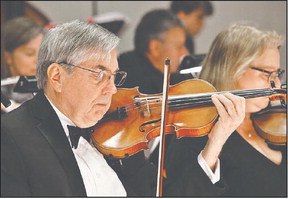
By Jan Askin
Rossmoor Big Band correspondent
Violinist Jim Dilworth has been playing since 3rd grade
The Rossmoor Big Band (RBB) has not been able to perform during the shelter-in-place. One way the band’s directors, Maurice Levich and Greg Brown, have kept band members united has been through Zoom. We look forward to returning to Rossmoor to play Big Band sounds.
RBB band members arrived at rehearsals with little fanfare, pre-pandemic. We unfolded our black music stands in the Hillside Clubhouse, assembled our instruments, quietly greeted fellow section members, and released a cacophony of warmup scales, exercises and tuning notes.
A bit of whimsy, however, greeted those lucky enough to sit behind the violins where we admired a stand decorated with arabesques, flourishes and musical notes in a pastel palette. Jim Dilworth’s daughter decorated the stand as a young musician and passed it “upwards” to him.
Violinist Dilworth has a photo of himself as a 3-year old holding a 1/32 violin. Seven or eight violins, increasing in gradation, followed. Like many Baby Boomers, he benefitted from California’s post-war investment in public schools. Musical instruments filled huge studios in Dilworth’s East Long Beach School District.
Starting lessons in the third grade, he could leave class three days a week: a kid’s dream. In high school, he played violin in a quality 90-piece orchestra that was immersed in a challenging classical repertoire. Along the way, he picked up the banjo and learned the three-finger picking style leading to a lifelong love of bluegrass.
Uncle Sam interrupted Dilworth’s college career. He joined the army, eventually becoming a commander. It was not the violin that prevented his seeing combat. He was also a basketball player. His superiors put him on the Army team. He returned to school after the service and joined the Bechtel Corporation after graduation. He would not play the violin for the next 45 years.
As head of software development for Bechtel, Dilworth and his family did not experience the countless overseas assignments to work on its mega projects as many Bechtel families did, but he did travel some. Witnessing the explosive and severely polluting refinery fires in Kuwait, set by Iraq during the Gulf War, became an indelible memory. Dilworth’s software – Enterprise Resource Planning (ERP) – tracked the status of the fires. The smoky skies from California fire season are a reminder of that time, though not nearly as severe.
Four years ago, Dilworth moved to Rossmoor and began to attend concerts at the Event Center. He was astonished by the first concert he attended: The Big Band of Rossmoor. The inclusion of violins and woodwinds with the more traditional instruments of brass and rhythm sections is a signature feature of RBB and intrigued Dilworth. He approached director Levich immediately after the concert. Partial to strings, Levich responded, “I want you and your violin down at Hillside Center next week.” Picture the iconic poster of Uncle Sam demanding, “I Want You!”
What is it like to join a band after a 45-year break? Dilworth says his first time sitting in with RBB “was like drinking from a fire hose,” being new to the swing beat of jazz. Yet, the notion of playing strings in a Big Band was worth the initial challenge. He has become a solid member of the strings section.
He also plays in the Rossmoor String Ensemble and the Diablo Symphony Orchestra, where playing amidst the full sound of the symphony orchestra is enthralling. Likewise, his favorite RBB pieces are the more orchestrated ones, such as the Fred Astaire medley. Perhaps owing to his musical relationship with his own daughter – and her music stand – he becomes “Misty” when our female student/senior member trumpeters play that tune.
Maurice “Mo” Levich, Director
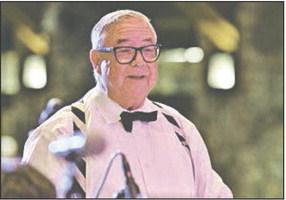
“Seventy-six trombones led the big parade with a hundred and ten cornets close at hand…” – From “The Music Man”
By Jan Askin
Rossmoor Big Band correspondent
Mo Levich has directed Big Band of Rossmoor for over 25 years
The Big Band of Rossmoor may have only six trombones, but it does have its very own Music Man: Maurice “Mo” Levich, band director for 25 years.
In fact, Levich was born and raised in Sioux City, Iowa, territory of the fictional River City in which reformed con man Harold Hill forms a boys’ band to the acclaim of charmed parents.
Levich describes his Iowa boyhood environment as one in which education had the highest priority, including music. He began trumpet in fifth grade. His allegiance to the trumpet began earlier at the age of 4 or 5 when he saw the 1959 film, “The Five Pennies ,” in which Louis Armstrong produced a sound on his trumpet that captivated the young boy.
Levich’s boyhood environment also contributed to his lifelong interest in the history of World War II. Photos of his father and uncles in their WWII military uniforms hung in the family’s home instilling a sense of pride.
Later in life, Levich was presented the opportunity to play 6:45 a.m. taps and raise the flag at the American Cemetery in Normandy, France. Overcome by the memory of family, love of country and the sacrifice of servicemen, Levich could not produce a sound. He would reprise the Big Band sound of that era in the Rossmoor Big Band.
He did not originally leave Iowa for California to build a band; he came to build houses. He started college at the University of Denver but soon found a way to move to California because of its advanced approach to construction. He received a degree in finance and real estate law from Fresno State. After learning the why and how of construction, he began his career, building hundreds of houses.
His trumpet may have spent some time in the closet early in his career, but Levich was always cognizant of its presence.
Back in the ‘90s, Bobbie Landers, mayor of Orinda, called on him for help with the Fourth of July parade. The “Music Man” put together the only pick-up marching band of the region: nine musicians. The band grew over the years and was featured in the parade through 2019.
The Rossmoor Dance Club also participated, bringing Levich to the attention of Vernon Brown, the Rossmoor resident who recruited him as director of Rossmoor Big Band in 1996.
A motley crew of curmudgeons greeted Levich at his first rehearsal. They needed a leader but did not want one. Levich was undaunted and also intrigued by the presence of two violinists, which added a unique factor to a big band. A big band usually consists of 18 chairs; they were short at least eight to 10 players. Levich had a vision: an intergenerational vision.
As an active participant in the community, Levich had been involved in developing a summer jazz camp with the inimitable Stanley Middle School teacher Bob Athayde. Between the two of them, they began to recruit some of the student stars into Rossmoor Big Band. The result has been the longest running intergenerational big band in the country.
Levich’s 25-year directorship has not been without challenges. Particularly sad for Levich was the passing of Frank Como who arranged so many of the Rossmoor Big Band’s best repertoire. Yet the highlights heavily outweigh the challenges, such as getting genuine red and white bandstands. Here are a few more:
- The tribute concert to Frank Como with Jason Marsalis and the new Lionel Hampton Big Band.
- Concerts on board the SS Jeremiah O’Brian during Fleet Week, 10 years, including the farewell bid to the 90 ship “Mothball Fleet.”
- Visits by jazz celebrities Mary Fettig and Mick Gillette
- Receipt of the national Jefferson Awards for public service
- Inauguration of “Tribute to the Troops” at the Lafayette Reservoir, ongoing through 2019
Looking to the future, will Levich tinker with his six vintage automobiles, pursue photography and travel and embrace rebuilding the band?
“Every week we don’t rehearse, the band becomes weaker,” he said.
There appears to be no end in sight to pandemic woes. The challenges are many but not beyond the capacity of this music man. Music now more than ever is important.
To quote Levich, “Music changes our mood. It unites people.”
The Rossmoor Big Band has not been able to perform during the shelter-in-place. In the meantime, the band’s directors, Maurice Levich and Greg Brown, continue to find innovative ways to keep all the members connected. The band members look forward to returning to Rossmoor to play Big Band sounds in the near future.
Emma Bustamante, Trumpet
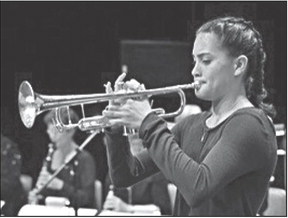
By Jan Askin
Rossmoor Big Band correspondent
Big Band of Rossmoor trumpet player Emma Bustamante
Big Band of Rossmoor trumpet player has perfect rehearsal companion
The Big Band of Rossmoor has not been able to perform during the shelter in place but continues to keep members connected through weekly “Director’s Notes” meetings on Zoom.
Band members look forward to returning to Rossmoor to play Big Band sounds in the near future. Member profiles are a way for the band members to stay connected with Rossmoor.
A brain puzzler: How do labradoodles, surfing and mangoes go together?
Musicians largely practice in solitude. Yet, Emma Bustamante, who plays one of the seven trumpets in the Big Band of Rossmoor, has found the perfect rehearsal audience: her labradoodle named Plato. When she begins to play, he comes into her room and lies down for his own private concert.
Bustamante is one of the band’s student musicians. She is starting her junior year at Campolindo High School, where she is enrolled in two music programs, the jazz band and the symphonic band. (As of this writing, classes are remote, and one wonders how music instruction will adapt to Zoom.) She is also starting her third year with Big Band of Rossmoor.
Bustamante first played ukulele in church bands. She started to play the clarinet in elementary school and switched to the trumpet in sixth grade. At Walnut Creek Middle School, she played in the jazz band directed by Rita Zigas-Brown. It was there that she was introduced to the music played by the Big Band of Rossmoor.
Zigas-Brown is wife of Northgate High School Music Director and Big Band of Rossmoor Co-Director Greg Brown. The two bands had group interactions and each band played at the Generations in Jazz Concert at the Rossmoor Event Center in spring of 2018. The Walnut Creek Middle School band stole the spotlight at Generations in Jazz.
Bustamante is a devoted member of the band. Mo Levich, Big Band of Rossmoor director, says, “Emma brings a certain spirit, youthful enthusiasm and smile to each rehearsal and performance. Couple this with her inquisitive personality and the band has an amazing student associate to enjoy music with.”
She enjoys the freedom of expression at rehearsals. And those seven trumpeters sitting in the back row seem to stir up more fun than the other sections. Her favorite Big Band of Rossmoor standards are “I Can’t Get Started” and the “West Side Story Medley.”
While she loves playing jazz tunes – her favorite trumpeter is Dizzy Gillespie – Bustamante listens to a variety of genres. Jack Johnson, best known for soft rock and acoustic rock, is a favorite.
Her other great love is swimming. In fact, when the band had in-person rehearsals, Bustamante often showed up with wet hair, having just worked out in the pool. She swims for Orinda Aquatics year-round and is learning to surf.
By the way, Bustamante’s favorite snack is mangoes.
The Big Band of Rossmoor is an intergenerational band whose members range from intermediate and high school students to seniors. Many of the seniors in the band live in Rossmoor. The band is under the direction of Mo Levich and Greg Brown.
Karen Moe, Flute

By Jan Askin
Rossmoor Big Band correspondent
Music is family affair for flautist Karen Moe Big Band flutist
Five months into the COVID-19 pandemic, Rossmoor Big Band members are still playing their music while sheltering in place. When they can play together again, the band members are looking forward to returning to Rossmoor and putting on one of their memorable concerts at the Event Center.
In the meantime, the Big Band wants Rossmoor residents to stay connected with members. The regular member profiles are a way for residents to get to know the intergenerational band members.
Karen Moe, flautist, is the subject of this profile and part of the parent/ child member profiles. Charlie Schretzmann, her father, was profiled in the July 22 issue.
Some family influences are quite apparent, such as the shape of the nose or the color of hair. It is more interesting to note less salient family influences, such as musical ability.
Moe shared an early memory of her dad. He would put an LP on the stereo, take out his trumpet, and play along with no sheet music in front of him. She was in awe of this ability.
She also shared a memory of open mic night at Whispers, a former family hangout. Her dad would take her and one of her brothers to dinner and then play for “what seemed like hours.”
Moe’s childhood is a tale of two coasts. She grew up on Long Island through eighth grade, then moved west upon her father’s transfer to San Francisco. She started playing the flute in fourth grade and continued through high school at Campolindo in Moraga. She returned east for school at Boston University, then came back to the West Coast.
Schretzmann was thrilled she returned right after college and encouraged her to join the musical group in which he was active: the San Ramon Community Band. They subsequently joined the Martinez Community Band and then the Lamorinda Community Band, before finding a home in the Rossmoor Big Band.
It’s on the West Coast that Moe pursued a teaching credential/master’s degree at the University of San Francisco and joined the teaching staff at Lafayette Elementary School. It was there that she met her husband, Scott Moe. One of his fifth-grade students set them up with a hilariously “forged” Valentine’s Day card. The staff fondly referred to the couple as the Schmoes.
Father and daughter’s musical affinities differ. Though both the trumpet and flute are high-pitched, the comparison ends there. The trumpet is a brass instrument played with valves. The flute is considered a woodwind and played with keys.
Schretzmann plays by ear; Moe sight reads music. While Schretzmann has always loved a Latin rhythm, Moe is true to her classic rock generation, fortuitously because her husband plays on the drum kit for his rock group, The Jesters.
Before joining the Rossmoor Big Band, Moe played mostly classical, melodic numbers. Since joining, she listens to music differently.
Frank Como, the late arranger for the band, wrote some interesting parts for the flute. Her particular favorites include “Pavanne,” the Fred Astaire Medley and “West Side Story” medleys.
The Moes’ two children also love music. Kyle has tried a couple of stringed instruments and whistles harmonies much like his grandfather. Amanda has played the trumpet, which seemed to come quite naturally to her. No big band music for them. Yet.
Charlie Schretzmann, Trumpet
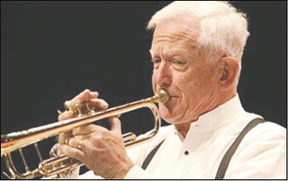
By Jan Askin
Rossmoor Big Band correspondent
Charlie Schretzmann plays the trumpet in the Rossmoor Big Band, where his favorite pieces are anything arranged by Frank Como.
Rossmoor Big Band to feature parent/child band members
Trumpeter Charlie Schretzmann’s daughter plays flute in the band
Rossmoor Big Band members are still playing music – just not in the same room with each other. The Rossmoor Big Band has not been able to perform together during the last few months, but its members are still playing and have plans to bring a concert to Rossmoor in the future.
The member profiles are a way for the band to stay connected with Rossmoor. This week begins a series that will profile the parent-child members of the band, both past and present.
Listen carefully, and you may pick up the hints of a New York accent in conversation with Charlie Schretzmann, who grew up in the Big Apple. Although he did not play the trumpet until high school, nor did he learn to read music, he was always blowing, starting with a single valve, high register “piston bugle.”
While in grammar school, he played in a fife and drum corps, later joining the Blue Devil’s Drum and Bugle Corps. He played throughout high school and college at St. Francis in Brooklyn, earning a degree in public accounting. His audition as a trumpeter for his six years in the U.S. Marines was unique.
Hijinks led to Schretzmann’s gig playing morning “Reveille.” As a new recruit, he learned to keep a low profile. However, one day the drill sergeant spontaneously yanked the nozzle off a fire hose. “Can anyone play this?” he offered. Schretzmann was mum, but his buddy had heard him play and exposed him. Following his audition on the fire nozzle, he awoke his fellow recruits every morning and also played the “Star-Spangled Banner” at the Reserve Center.
Schretzmann never stopped blowing throughout his long career with a big accounting firm in New York, then with International Paper, then with a subsidiary of IP, bringing him West in 1987. Having divorced, he brought his three kids with him to the Bay Area and settled in Moraga.
Florence, a widow, lived across the street from him with her three children. Their children bonded quickly. When Florence and Charlie married, they officially became a Brady Bunch. Growing up, daughter Karen, flautist in the Rossmoor Big Band, remembers how he would put on an LP, plug on his mouthpiece and improvise along with the music.
A holiday concert at the Rheem Theatre piqued Schretzmann’s interest in the Rossmoor Big Band. He contacted director Mo Levich and arranged to sit in with the band. At his very first rehearsal, he was seated next to Bob Sutherland, Rossmoor resident and the band’s nonagenarian trumpeter emeritus and president of the band.
Schretzmann played in the Lamorinda Community Band, the San Ramon and Martinez community bands, but the Rossmoor Big Band became his priority. He has loved jazz since age 10 or 11 when his dad introduced the family to the Latin rhythms of Edmundo Ros, who has continued to influence his musical tastes.
Schretzmann’s favorite pieces in the Rossmoor Big Band repertoire include anything arranged by Frank Como. Late of Rossmoor, Como was instrumental in obtaining Greg Brown as co-director, a move the band applauds.
Schretzmann produces achingly sweet sounds when he plays those Como arrangements. He is now a confirmed and beloved member of the Rossmoor Big Band, taking on the extra-curricular duty as “keeper of the music.” He recently completed PF files of all the hand-written numbers in the band’s binders, a laborious task.
When he looks back, he says, “It’s been a long, fun journey.”
Karen Moe, Schretzmann’s daughter, is the subject of the next Big Band profile.
Bob Sutherland, Trumpet
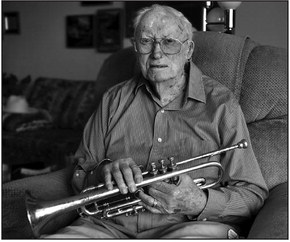
By Leslie DeWolf
Recreation assistant, Rossmoor News
Bob Sutherland, leader of the Tice Valley Jazz Band. News photo by Dan Rosenstrauch
Joy of family: Resident overcame the ravages of war, loss of first wife
Robert Sutherland was born in 1924 and grew up on the Park Street side of Alameda, in a close-knit community where you knew your teachers and the drug store owner, and a kid could expect to get a part-time job from a local business owner.
As a boy, Sutherland enjoyed small-town things like swimming in the Bay with friends and breakfast at Ollie’s Waffle House. While attending Alameda High School, Sutherland played trumpet, joining the orchestra, marching and ROTC bands.
In 1942, Sutherland joined the Army Air Corps, training at the radio school for the 316-fighter control squad, almost a year. On Jan. 8, 1944, Sutherland was stationed in England – six months – for air and sea rescue, using the 3-point radio tracing, listening for May Day calls to help crippled allied aircraft get back, possibly having to land in the English Channel. “What was to come was the buzz bombs – a newly designed, unmanned aircraft, aimed at London,” said Sutherland, who was listening for aircraft when the roof was blown off the building.
After England, Sutherland was stationed in France, Holland, Belgium and Germany. Arriving in Normandy 16 days after D-day, the radio squad was deployed as watchmen, as 20 miles were needed for the radio technology and, at the time, allied forces had advanced four miles. “Did you ever see ‘Saving Private Ryan?’ It was just like that,” said Sutherland, speaking of the devastation.
Arriving in Belgium the first of December, planes were grounded because of the weather. The truck acted as quarters; “it had very high-quality direction-finding equipment that was sensitive,” said Sutherland, adding “we didn’t have the Ritz but were grateful to be off the ground, not sleeping in mud, freezing to death during Europe’s coldest winter in 70 years.”
Sutherland said the war-weary Belgians welcomed their arrival. “We were in one little village the first of December, ready to move into Germany when the enemy made the counter Battle of the Bulge, catching us off guard. The weather kept planes grounded, so we were stationed there until the middle of February,” Sutherland said.
Called “the greatest American battle of the war” by Winston Churchill, the tide turned when the weather cleared and planes could fly again.
Sutherland’s squad employed radio wave technology, pinpointing enemy targets. “German pilots didn’t have a way to get a fighting plane over a target. We had air superiority,” he said.
Sutherland was in Germany when it surrendered in 1945. Not a drinker but a man of his word, Sutherland promised his squad he’d get drunk when they won – and he did. “We discovered cases of Portuguese wine in the German army officer’s barracks, 88 bottles of muscatel wine,” Sutherland said. The wine was also liberated!
“After Germany’s surrender in May, we reorganized and I signed up to go to Japan, leaving Marseille, the same day the bomb hit Nagasaki,” Sutherland said. “I was on a ship heading for the Philippines when we got news to change course and go to Virginia.”
For his service, Sutherland received five battle stars, including one for the battle of England Fighter Bombers. When released from active duty, Sutherland utilized the GI Bill to attend UC Berkeley, getting his degree in Business Administration in 1950.
Sutherland and his first wife, Janell, had two daughters. Sadly, Janell died after a battle with cancer. At 42, with two small daughters – Laura and Jana – Sutherland was set up with Ann by mutual sorority and fraternity friends.
When married, the couple created a close blended family with four children under 8 “who all got along great right from the start,” said Sutherland, adding “funny how three of them are teachers and one a psychologist” – all jobs that help people.
Living paycheck to paycheck for a while, Sutherland eventually became part owner of a 50-tanker trucking firm that hauled combustible liquid. Finding it a tough business, along with the fact that his parents died at 59, Sutherland sold the business when he was 58.
The Sutherlands sold their house, buying a camper to cross the country for a month with their kids. After that, the Sutherlands traveled – just the two of them – once to Alaska for four months and later six more months all over the United states.
After moving to Rossmoor in 1982, Sutherland started practicing or performing almost daily, with the Diablo Light Opera, Diablo Symphony and the Rossmoor Big Band. He founded the Tice Valley Jazz Band, which has been featured at Rossmoor’s Fourth of July celebration for 25 years.
In his 38 years in Rossmoor so far, Sutherland has been active with the Dixieland Jazz Club, Kiwanis, Rotary and the Diablo Symphony Guild – fundraising for the symphony.
At 96, Sutherland says he is content with his life and couldn’t ask for more, having just come from their annual family reunion at Trinity Lake, Camp Coffee Creek with Ann, his kids and grandkids – two of whom have just graduated college and are on their way to becoming teachers.
Neva Flaherty, Flute
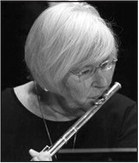
By Jan Askin
Rossmoor Big Band correspondent
Neva Flaherty plays the flute at a Rossmoor Big Band concert.
Meet Rossmoor Big Band flutist
The Rossmoor Big Band has not been able to perform during the shelter-in-place, but it does not want its fans to forget that it is still around and looking forward to returning to Rossmoor to play its Big Band sounds in the near future.
The member profiles are a way for the band to stay connected with Rossmoor. Neva Flaherty, Rossmoor resident, flutist, and member of the Golden Rain Foundation Board, is the featured band member this week.
Hoots and hollers fill the Rossmoor Event Center when the Rossmoor Big Band plays a concert. Flaherty describes the thrill of being appreciated by the Rossmoor crowd. Indeed, she remembers being overcome by the sound of the Big Band when she first sat in, near the center of the band. The fullness of sound, blend of instruments and lively swing beat thrilled her.
“How incredible to be in the middle of this sound,” she remembers.
Flaherty is new to the West Coast. She was a lifelong East Coast resident until her daughter prevailed upon her to move west. A trial period of two months renting in Rossmoor in 2016 led to her “big move” in 2019. The move took tremendous work, as anyone who has sifted through a lifetime’s collection of social attachments and belongings can attest. She embraces California as a place where she can really be herself. Flaherty received her undergraduate degree from Cornell University after leaving her childhood home in New Jersey. She earned a journalism degree from Columbia University. She was a journalist for many years. As a single mom, she returned to Ithaca, New York, to earn her law degree from Cornell.
She obtained work in the prosecutor’s office after law school. But after a three-month trip through Southeast Asia, she returned stateside with a desire to be her own boss. She purchased an inn on Block Island, Rhode Island, and ran the inn for nine years. Next, she moved on to Cape Cod and worked for U.S. Congressman Bill Delahunt.
Like many of the senior members of the band, Flaherty took a 25-year musical hiatus during her professional years. She learned to play the flute in high school, at first trying to cover the flute’s entire embouchure hole with her mouth rather than blow over it like a coke bottle.
She started playing again while living on Block Island. She hopped on the ferry to the mainland one day and had to spend the night before returning by ferry the next day. She brought her flute with her to Cape Cod, where every small town has summer concerts. Flaherty participated for 15 summers in the Brewster community band. Flaherty’s first encounter with Rossmoor Big Band is memorable. Each member is given a weighty music binder upon joining. When she opened her binder for the first time, out fell a note: “Joining the Rossmoor Big Band was a great choice. This is a really special group of people and you are seriously in for a treat. I hope you understand the magic of this band and I hope you respect that. Good luck to you and I hope you have fun! Love, the previous owner of the book.”
Flaherty was recently elected to the GRF Board, participates in the community choir arm of the Oakland Interfaith Gospel Choir, and is a devoted swimmer. However, she reserves her greatest enthusiasm for playing in the Rossmoor Big Band.
During shelter in place, interviews of Big Band members take place over Zoom.
Maxfield Hunt, Trumpet
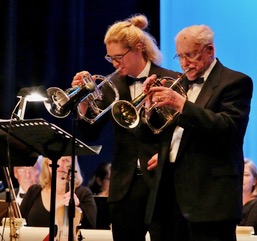
By Jan Askin
Rossmoor Big Band correspondent
Photo of Maxfield Hunt and Bob Sutherland by Brian Yuen.
The Rossmoor Big Band has not been able to perform during the shelter in place, but it does not want its fans to forget that it is still around and looking forward to returning to Rossmoor to play its Big Band sounds in the near future.
The member profiles are a way for the band to stay connected with Rossmoor. Maxfield Hunt is the featured band member this week.
Hunt is a college student, majoring in communications. He is not sure yet exactly where that will lead, but he claims an unwavering draw to entertainment and to jazz. His resourceful physician father gave Maxfield his first drum at age four. Hunt has limited use of his right arm and “drum physical therapy” proved musically prescient.
A child of a multi-generational musical family, Hunt’s musical growth took off. His hair growth took off as well. His father had long hair and it never occurred to the family to visit a barber.
Most of us never consider what instrument can be played with one hand, but Hunt did. That is how he became a trumpeter. A second musical awakening occurred in the band room at Stanley Middle School in Lafayette. Hunt had been taking lessons from the venerable music teacher there, Bob Athayde, and the family moved to Lafayette so that Hunt might more directly work under Athayde’s influence.
Hunt arranged his academic schedule so that four of his classes occurred in the Band Room so he could absorb the musical aura of the room.
Athayde introduced Hunt to Big Band music, which became his passion. In addition, there always seemed to be a volunteer from Rossmoor helping out in the Band Room like Nick Longo, who along with Athayde, told Hunt about the intergenerational Rossmoor Big Band.
Once in the band, Hunt came under the influence of yet another mentor, the band’s director, Mo Levich, who has been Hunt’s friend for 11 years.
Observers may have noticed a self-conscious demeanor when the long-haired kid in funny pants showed up at the first rehearsal, but when Hunt brought out his horn and started to play, everything but the music melted away. He had found his peer group. Hunt describes joining Rossmoor Big Band as “discovering a gold mine.”
Hunt is a very dedicated member of the Rossmoor Big Band. He is participating in his 11th season. Not too long ago, Hunt performed a duet with nonagenarian Rossmoor resident Bob Sutherland (in photo along with Maxfield) at the Event Center. Members cherish their memorable rendition of “My Foolish Heart.”
Frank Como, an arranger for Lionel Hampton, director of the Rossmoor Big Band, and Rossmoor resident until his death in 2018, arranged this piece specifically for the band. Hunt claims that the pieces Como arranged for the band are his favorites, particularly the Fred Astaire Medley.
Hunt describes Como as someone whose musical senses never declined; that he kept “swingin’ as he always had.”
Hunt has had other influences. In early childhood, he listened to a lot of punk rock as his neighbor was Billie Joe Armstrong, founder of the group Green Day. Hunt also took lessons from Mic Gillette, one of the founders of the R&B band Tower of Power.
He plays with the Bay Area Big Band. He sits in on a Bay Area group called Lady Kay and the Kings of Swing, feeding his love of Louis Armstrong and the Rat Pack. He serves as a substitute for several other groups.
When the Rossmoor Big Band hosts another concert in the Rossmoor Event Center, residents will be able to see Maxfield Hunt in action and hear the tremendous work of the band’s trumpet section.
Ron Solis
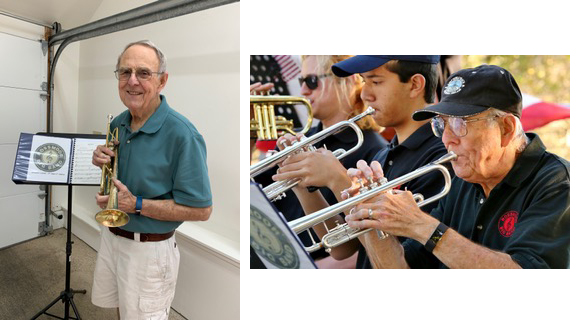
Ron Soulis rehearsing in his Rossmoor garage (left), Ron Soulis at “Tribute to the Troops” playing next to Maxfield Hunt (right)
By Jan Askin, Rossmoor Big Band correspondent
Photos by Brian Yuen, Big Band parent photographer and Ron Soulis
The Big Band of Rossmoor continues its Member Profile Series with this interview of Rossmoor resident and Big Band trumpeter, Ron Solis.
Soulis’ love of music started early in a music-loving family. He started to play the trumpet in fifth grade at Parker Grammar School in Oakland, played French horn in high school orchestra and trumpet again in the ROTC Air Force Band. As a kid, he remembers loitering outside Oakland’s bars, listening to the Dixieland music streaming out the doors. The Soulis family formed its own Dixieland house band, with Ron on trumpet, mom on piano, each of the next two brothers on trombone and clarinet, and dad on the drums.
Soulis put down his trumpet during his years working as an engineer but continued to feed his musical appetite through attendance at live musical performances. He remembers the fun of once sitting in Hugh Hefner’s box at the Playboy Jazz Festival at the Hollywood Bowl! And, as an opera aficionado, he and his wife Maureen have enjoyed season tickets to the opera for over 10 years.
When Soulis moved into Rossmoor in 2008 he joined the Big Band of Rossmoor.
At his first rehearsal with the Big Band, Soulis recalls that he sat next to fellow trumpeter Herb Sontag. Sontag, a former member of 25 years, helped him navigate the Big Band’s music challenges. Soulis feels a responsibility to continue that tradition to support young members today. He points with pride to the young (and old friends) he has developed over time in the band.
The Big Band of Rossmoor regrets that it could not hold the Generations in Jazz Festival concert in Rossmoor on April 23 due to “shelter in place.” The band continues to meet on Zoom in preparation for the time when it will be back.
Julia McLeod
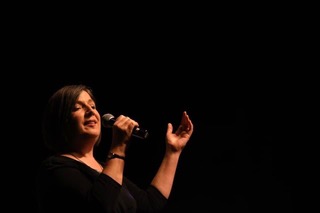
Rossmoor News
Published June 10, 2020
By Jan Askin,
Club Correspondent
Julia McLeod is the first chair violinist for the Big Band of Rossmoor
Big Band of Rossmoor violinist has played since she was 8
The Big Band of Rossmoor members missed performing for Rossmoor this spring, but it still wants to keep in touch with residents by continuing the member profiles. This week, the featured member of this intergenerational jazz band is first chair violinist Julia McLeod.
McLeod grew up in Cambridge, England, and began playing the violin at age 8. Her violin was handmade by her father and she continues to play it to this day.
She was introduced to Big Band music through her first boyfriend who played the trombone. She remembers frequenting English flea markets on their dates in search of vinyl recordings by musicians such as Ella Fitzgerald and Ray Ellington and a harrowing drive through a snowstorm in an attempt to attend a performance by Nina Simone.
McLeod graduated from the University of Brighton with a bachelor of arts degree in fashion textile design with business administration. Her first job was in the woven textile industry at T.W. Thorpe in North England and Scotland.
McLeod was married in 1990 to Tony Phillips and they moved to New York in 1992. They lived there a few years, started a family, moved to Zurich, added to the family, moved to Hawaii, and finally settled in the Bay Area. She lives in Walnut Creek, but not in Rossmoor. She has two adult daughters.
While in the midst of career and family, McLeod stopped playing the violin. She continued to love music and taught parent-child music and rhythm classes in a program called Music Together offered at Lamorinda Music. She was invited to a Rossmoor Big Band meeting by two of her former students.
So, inspired and intimidated, she “sat in” with the band in 2016. (Sitting-in is how the band tries out potential members – you sit-in and play the music, sight-unseen, and then you wait for a call.) McLeod felt some intimidation on first joining the band. Violins are tuned to different keys than the other sections. It takes some fingering adjustment to play the jazz repertoire. Plus, the violins are in front.
In 2020, the band was looking for a female singer and after a few unsuccessful interviews, asked McLeod if she would like to give it a go. She accepted with trepidation and did a fabulous job at the band’s last performance (see accompanying photo).
McLeod loves playing in the band, getting to know the people and history that make the Big Band of Rossmoor so special and keeping her skills fresh. The violin section continues to grow under her watchful eye to five members – three adults and two students.
The Big Band looks forward to hosting another concert in the Rossmoor Event Center. Residents will hear the tremendous work of the band’s violin section to provide a musical foundation and emotional color to the pieces the band plays.
Emily Xie
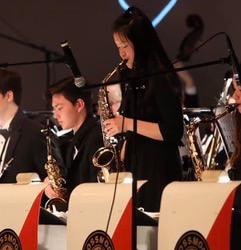
By Jan Askin, Big Band correspondent
Photo by Brian Yuen, Big Band photographer
The Big Band of Rossmoor is an intergenerational band whose members range from high school students to octogenarians.
During most Big Band of Rossmoor performances, Xie makes her way calmly to the front of the stage, raises her instrument and blows the audience away with her solo.
Xie is a junior at Las Lomas High School in Walnut Creek where she plays alto sax in the jazz band and clarinet in the Wind Ensemble. She recently earned first chair alto saxophonist in the Contra Costa County High School Honor Band and participated in the California Band directors’ Association All-State concert Band.
She is often singled out for solo ability at school jazz festivals as well as for Big Band of Rossmoor.
Kara Ravina, the director of Instrumental Music at Las Lomas, reports that Xie’s recent honors speak to her playing talent but that it is her leadership skills that make her a stand-out student. She is a member of the Band and Orchestra Council, serving as outreach coordinator spearheading several mentor activities for partner middle and elementary schools.
As president of the Music Mentors Club, she pairs high school musicians with students interested in free private lessons. “She is an outstanding young person who embraces wonderful musicianship skills as a performer and advocate for music,” said Ravina.
Xie joined the Big Band of Rossmoor at the invitation of Greg Brown, one of our two co-directors who taught Xie privately. She found the first Big Band rehearsal a “little intimidating” but she quickly warmed to the opportunity to play in an intergenerational big band. She particularly loves watching members of the audience dance during the performances.
“Pavane,” a jazz reimagining of a Ravel composition, is her favorite number on the Big Band playlist. The Rossmoor Big Band arranger emeritus, the late Frank Como, layered the original nostalgia of “Pavane” with a dose of swing.
Xie’s favorite jazz ancestor is Phil Woods, who also played the alto sax and the clarinet, albeit in the middle of the last century.
In the early years of jazz there were few female models. The prejudice against mixed-gender bands was almost as great as that against mix-race bands. In the 21st century, attitudes have changed, nevertheless when Xie first walked into a band room she saw no female saxophone players, so she chose to learn the saxophone.
It is heartening to observe such an outstanding female musician and human being continue the jazz evolution.
James Cain
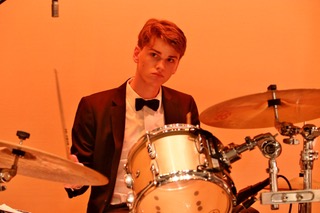
By Jan Askin, Big Band correspondent
Photo by Brian Yuen, Big Band photographer
The Rossmoor Big Band is an intergenerational band that includes members from local middle and high schools and from Rossmoor. Last week, the Big Band featured a senior at Northgate High School. This week, the Big Band would like to introduce its audience to another local high school senior.
The drummer/percussionist sits at the back of the band and is covered with a million drums. The casual listener may wonder, “What’s going on back there?” Indeed, quite a lot. The drummer sets the pace for the band. James Cain, senior at Acalanes High School, sets the pace for the Rossmoor Big Band (RBB).
Intergenerational membership is the signature feature of the RBB. The learning occurs up and down the age groups; Cain’s performance style is influenced by visiting the rhythms of the 1930s and 40s, the heart of the Big Band playlist.
By the same measure, older members of the band are exposed to cutting-edge contemporary musicians, when they hear him jamming at the beginning and end of rehearsals. Cain’s favorite percussionists are Mark Gulianna and Zack Hill who are at the forefront of a new kind of drumming, often one of speed, power and precision.
Cain started to learn the piano at age 5. He played drums later on in school and in the high school band. He started playing vibraphone for Acalanes his sophomore year and looked for a way to maintain and hone his skills as a drummer. He joined RBB three years ago and reports that he has made unexpected connections with players of all ages.
A dedicated musician may be evidenced by outside pursuits. In his free time, Cain likes to produce music. Listen to his album Machinebox at rjamescain.com. Another factor indicates Cain’s dedication. He must arrive early and leave late to and from rehearsals. It takes a lot to schlep in, set up, break down and schlep out the drum kit.
“James is an incredible musician and human being,” said Lauren Gibson, music director at Acalanes High School. “His musicianship and insight into the pieces we perform are always invaluable to our ensembles. No matter what challenge I throw his way, he is always up to meet it head on. James is one of our valued leaders as both a student conductor and Pep Band leader. It is very obvious that James’ peers respect and value his musicianship and energy. James has made such a positive and lasting impact at AHS. He is an amazing student and will be greatly missed next year!”
Alexander Hussein

By Jan Askin, Big Band correspondent
Photo by Brian Yuen, Big Band photographer
The Rossmoor Big Band is an intergenerational band that includes members from local middle and high schools and from Rossmoor. The youngest member is 14 years old and as oldest member is 95-year-old.
Age is one way to be intergenerational but when looking at individual members of the band, there are other dimensions of being intergenerational.
Alexander Hussein, a senior at Northgate High School, plays first tenor saxophone. He started to play sax in the fourth grade, a traditional time for young musicians in public school to select an instrument. Why the sax and not, say, the trumpet or the trombone? He explains that his grandfather played the sax and that was the instrument available to him. Now that’s intergenerational.
Hussein’s favorite sax player is Dexter Gordon, one of the original bebop tenors from the mid-40s. That’s intergenerational. This choice indicates the depth of his understanding of and commitment to jazz. Many students his age would list as default forebear, the more commonly known John Coltrane. Hussein shares non-musical attribute with Dexter Gordon. “Dex” was 6’6 and Hussein approaches that height.
Hussein has played in the Rossmoor Big Band for four years. He calls it a “feel-good” band. He is a member of the elite Jazz I at Northgate High School and plays in the woodwind ensemble there under the Director Greg Brown. Brown, also co-director of Rossmoor Big Band, says, “Alexander is a dedicated, hardworking musician, as well as a very humble, ever respectful and consistently generous young man. He can always be counted upon to pitch in or lend a hand.”
So, what is next for this high school senior? It is college application season. His dedicated focus on music is reflected in his applying to institutions such as the Berklee College of Music and the Manhattan School of Music. All of us in preceding generations wish him the best.
